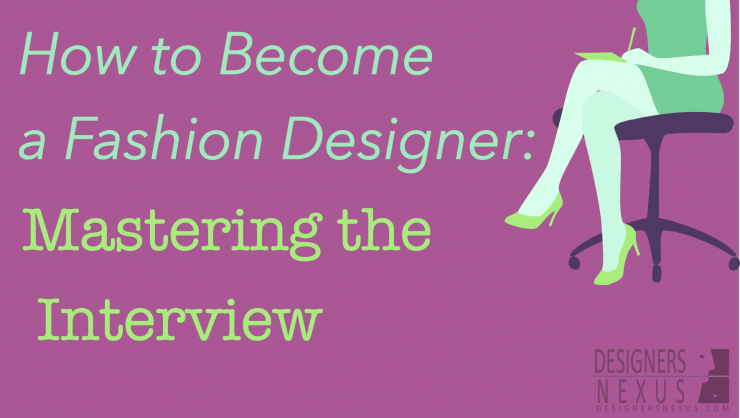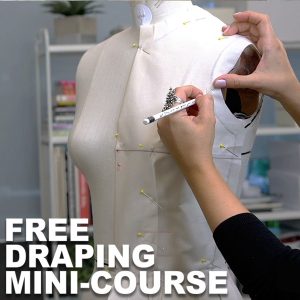What You Need to Know to Master the Interview
How to Become a Fashion Designer ( Part 9 )
Know Your Stuff
By now, you should already have a great deal of research completed for the market, and maybe even the company you'll be interviewing in. Pull out the information you have so far and study it thoroughly. You may find that you'll need to gather some more to fill in areas you've missed. Try to become familiar with as many of the following areas as possible: company history, their current collection, price point, stores they sell to, major competitors, their target customer, design philosophy, and any current news or projects in the works.
Know Where to Look
If your meeting is with a high profile company, this information should be readily available. Found in your local library and bookstores, major resource books like Dunn & Bradstreet, Fairchild's Market Directory of Women and Children Apparel, Menswear Blue Book, Sheldon's Guide to Retail Stores and Resident Buying Offices, and other directories can help you gather basic company information. Infomat.com is an excellent online source with a collection of related fashion industry key players, trade events, hot topics, and market research and directories. WWD.com and www.StyleDispatch.com are great places to look for the latest company news. And don't forget that most companies have their own websites, which often include a company history, design philosophy, retail locations, as well as current and previous collections, and press releases.
If the company is more obscure, you may have a hard time locating this information - and that's OK. Many job listings in WWD and other publications don't even list the name of the company! Many times, I have faxed my resume in response to anonymous ads and didn't find out the company name until they called me to schedule an interview! In these cases, just knowing and understanding the market you want will be all you need. If it turns out the company doesn't fall within your desired market, you'll know that the position isn't right for you. And if it is within your market, then you already know the product and will have no problem talking it up!
Know What to Say
Don't expect to enter the interview and improvise answers off the top of your head. I remember going to an interview with only a loose idea of what I wanted to say, but once I was in the "hot seat", my nerves took over and I completely blanked on my answers! If you prepare your answers ahead of time, you can make sure that you're nerves don't get in the way. Make a list of interview questions you're likely to be asked and take the time to compose your responses to them. Use what you've learned about yourself from the career assessments we mentioned in "Setting the Course", to answer questions regarding strengths, weaknesses, skills, values, and long and short term goals. Also be sure to incorporate your knowledge of the market and company into your responses to demonstrate your serious interest in the company.
Below are just some of the questions you should be prepared to answer:
- Can you tell me about yourself? / How would you describe yourself?
- Why are you interested in this position with our company?
- What are your greatest strengths? Weaknesses?
- Where do you see yourself five years from now?
- What motivates you?
- Where do you get your inspiration?
- What do you see in stores that you think is really great?
- If you had to predict the next big trend for the upcoming season, what would it be?
- I see you attended (college name), why did you choose that program? How did you like it there?
- What accomplishments have given you the most satisfaction and why?
- How do you work within a team environment?
- Are you willing to work longer hours?
- How quickly do you learn?
Make sure you're prepared to back up your responses with specific examples, or anecdotes. All the other candidates will tell the interviewer that they are creative, organized, and detail oriented. You need to make yourself stand out by telling the interviewer about the collection of meticulously hand beaded evening gowns you presented at your senior fashion show. Describe how your knowledge and skills relate to the position and how you can contribute to the company: "My understanding of garment construction will allow me to create accurate initial specs for sample development."
Also note that it's not enough to just write down your responses - you absolutely must practice them! Rehearse aloud, in front of a mirror, or even with a friend. Don't skip this step! Your responses should come as second nature to you during the interview - you won't create a good impression if you take a long time to recall your answers! All kinds of public speakers need to prepare for hours and sometimes days. I remember reading that a communication coach takes her an hour of preparation to deliver 10 min speech!
Know How to Dress
Suits usually aren't necessary for interviews unless you think you can make it work without appearing too stiff. A trendy interview outfit can be pulled off if you know more about the company, and dress for their market. For example, if you're interviewing with a company that specializes in career wear for women, you'll want to dress more formally and present a polished appearance. If you're interview is with a casual sportswear company, your outfit can be a little more relaxed, but not too casual - you are still on an interview!
If you have little or no information about the company you'll be meeting with, it's better to dress more moderately. No matter what, your ensemble should reflect your professionalism to make a good first impression. Your outfit should be fashion forward and express who you are without overdoing it.
Master the Interview
Equipped with your killer portfolio, your knowledge of the company, and your personality, you're prepared to enter the interview and show 'em what you've got! Greet your interviewer with a firm handshake and steady eye contact. Mirroring your interviewer is a good way to gain rapport and be accepted. This doesn't mean copy the interviewer exactly, (that would be creepy!) just subtle reflections will do. Mirror the way she or he sits; use the same tone of voice and sentence phrasing. If the interviewer asks "From where do you draw your inspiration?" You can respond "I draw most of my inspiration from..."
Answer questions honestly without bragging or exaggerating. If you're asked any questions that you don't know the answer to - be honest and say you don't know! For example, if you are asked how to create a vector mask in Illustrator, reply. "While I am proficient in Illustrator, masking is one area I am not yet familiar with, but I would love the opportunity to learn." Convey to your interviewer that you know school training is very different from actual industry expectations. Employers are looking for a candidate that won't be difficult to train, or take up too much training time. Someone who learns quickly and is willing to go the extra mile is a worthwhile candidate for the employer to hire. Express your interest in the company, and your flexibility and eagerness to learn and develop within the field.
And then, there are the no-brainers for any interview:
- Always arrive on time, preferably 10-minutes earlier since some companies will ask you to fill out an application or additional paperwork before you meet with the interviewer.
- Bring several copies of your resume since you may be interviewed by a team or panel.
- Don't discuss salary, work hours, vacation time, or benefits during a first interview unless the subject is mentioned first by the interviewer.
- Don't appear overzealous. Due to the competitive (sometimes backstabbing) nature of the fashion industry, some professionals are insecure and threatened by competition. You don't want to appear like a possible contender.
- If you are asked what your expectations are, give a range instead of a specific number and add that you are flexible. (Do your homework on what you should ask for - visit glassdoor.com or coroflot.com to make sure your range is reasonable with salary trend of the current market - also see these other fashion design salary resources.)
- Always ask for a business card for each person you interviewed with at the end of the meeting.
Ask Questions
At the end of the interview, you will likely be asked if you have any questions. You should always have some questions ready to further demonstrate your interest in the position. You can also use this as an opportunity to learn first-hand information about the company, or review a topic that was discussed earlier in the interview.
Some questions you may want to ask are:
- How would you describe a typical day on the job?
- How many people are on your design team and how is the department organized?
- How will my job performance be evaluated, and how often?
- What is the potential for growth and advancement within the company?
- Where do you see the company headed in the next few years?
- What is the next step in the interview process, and when can I expect to hear from you?
Remember that you are not the only one being interviewed. While the interviewer is trying to determine if you are the right match for the position, you should also be deciding if the company and the position are the right fit for you!
Post Interview
As soon as you get home from the interview, write a thank you note and email it to the interviewer(s). In addition to thanking the interviewer for taking the time to meet with you, you should also reaffirm how your skills and qualifications make you a good match for the position. Try building on some highlights from the interview.
Always send out thank you notes right away. It's pointless if it's received days or weeks after the interview! Even if you are no longer interested in the position, send a thank you note anyway to thank the recruiter for their time. You always want to leave a favorable impression; you never know when you may encounter the contact in the future! Many job seekers don't bother with thank you notes so yours will get noticed immediately.
Keep at It!
Sometimes, interviews don't always go as well as planned. I can't even tell you how many interviews I left thinking "I totally screwed that one up!", or "I'm not getting that one for sure!" It happens to the best of us so don't beat yourself up about it! Becoming comfortable with and mastering the interview process takes time and practice. The more interviews you go on the more confident you'll become.
Don't take rejections too hard. Job-hunting is very difficult and it's completely normal to face rejection more than once - especially within the super competitive fashion industry. It doesn't mean that you aren't an excellent candidate; it just means that the employer couldn't match your skills with the needs of the company. Stay positive, and always put your best efforts into preparing for each interview, and the right position will come along in no time!



